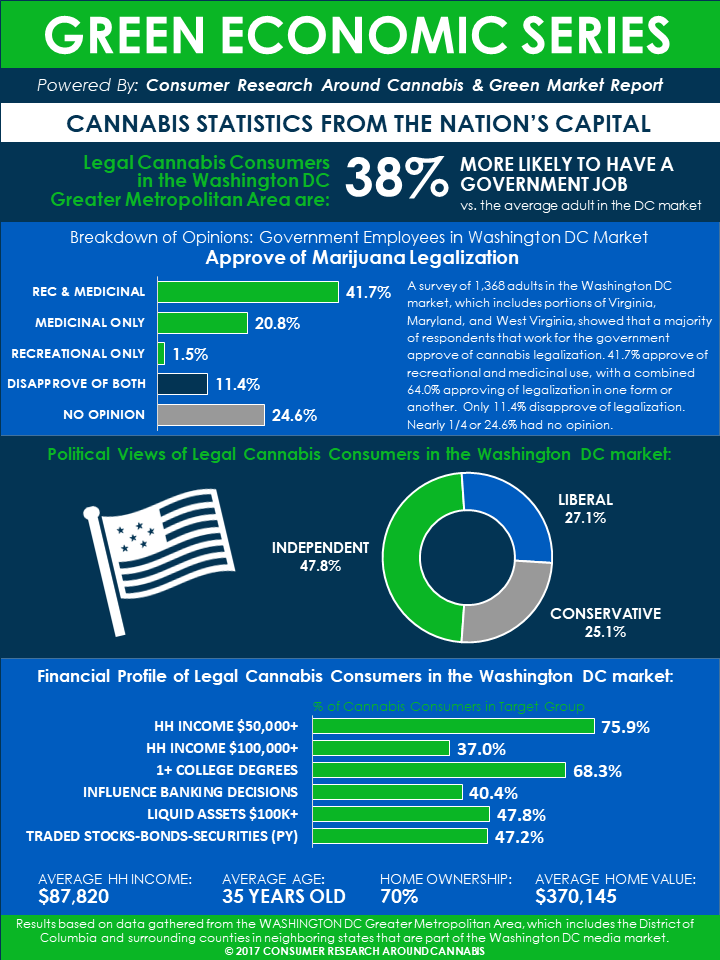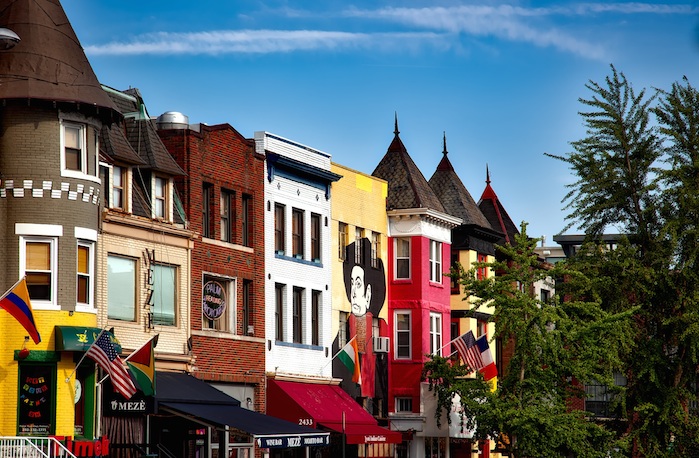Cannabis became fully legal in Washington D.C. in 2014 by way of voter ballot. The recreational industry has struggled to get started, though, due to influence exercised over the city government by the U.S. Congress. Washington D.C. is better known for its medicinal market.
It’s ironic that the national government would throw a monkey wrench in Washington D.C.’s recreational industry, since the city’s cannabis-buyers are 38% more likely to have a government job than their fellow area citizens.
This stat comes from the latest research report released by the Green Market Report and Consumer Research Around Cannabis.
Data collected used a sample size of 1,368 survey respondents within the D.C. market, representing an estimated 5,187,362 adults, and included adjacent portions of Virginia, Maryland and West Virginia. Of those people, 8% responded that they had purchased cannabis from a legal retailer or dispensary.
 The socioeconomic background of these 8% may surprise someone with preconceived notions about typical cannabis users.
The socioeconomic background of these 8% may surprise someone with preconceived notions about typical cannabis users.
The average annual household income for respondents who bought legal cannabis was $87,820. A total of 37% of them reported household incomes at or above $100,000, while 75.9% had a household income of at least $50,000.
Those with liquid assets valued at or beyond $100,000 equaled 47.8%, while 47.2% reported trading stocks and bonds. A total of 40.4% of cannabis consumers listed themselves as having the authority to “influence banking decisions.”
The majority of Washington D.C.’s cannabis consumers reported having reached higher learning: 68.3% had at least one college degree. Their average age was 35, and 70% of them owned a home, valued at an average of $370, 145.
“I think it’s clear that the data debunks many of the negative connotations attached to cannabis use – whether for medicinal or recreational use,” says Jeffrey Stein of Consumer Research Around Cannabis. “They are well educated, have good jobs and are financially sound. Cannabis consumer data like this should be a wake-up call to government officials and companies that have thus far ignored this growing consumer group.”
Those who had legally purchased pot were 30% more likely to have full-time employment versus the average adult in D.C., the research found. In terms of professional statuses, 32.3% considered themselves professional, while 55.3 % were “white collar” and 7.5% were “blue collar.” About one third (30.5%) own businesses, are a partner in a business or are at the level of corporate officer.
“These are occupations that are far from what the old stereotype of a ‘stoner’ was thought to be doing with their careers,” writes Cynthia Salarizadeh of Green Market Report.
Politically, cannabis consumers considered themselves “liberal” 27.1% of the time, “conservative” 25.1% and “independent” 47.8%.
Of those who reported working for the government, whether they purchased legal cannabis or not, 41.7% reported approving of recreational and medicinal cannabis. A total of 20.8% had a favorable opinion of medicinal only, while 1.5% approved of recreational cannabis but not medicinal.
“Results that indicate a significant number of government employees favoring the legality of its consumption as well as consuming it themselves, is clear indication that prohibition is outdated,” says Stein.
Government employees represented 17.9% of consumers who used cannabis for relaxation when alone; 20.5% purchased cannabis to enhance their experiences on during downtime or with friends, and 18.1% bought it to suppress depression and anxiety.
Of respondents who visited a cannabis retailer or dispensary three or more times a month, 34.1% were government employees. This same group represented 31.2% of customers who visited three or more times in a single week.
Government employees also comprised 37.3% of respondents who spent between $100-$299 on flower, and 50% who spent $300 or more on concentrates, when patronizing a retailer or dispensary.
Kyle Swartz is editor of Cannabis Regulator. Reach him at kswartz@epgmediallc.com or on Twitter at @kswartzz. Read his recent piece: This Is Your Average Cannabis User in Denver.










